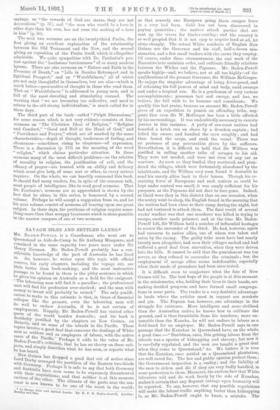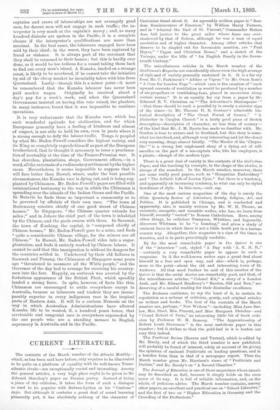SAVAGE ISLES AND SETTLED LANDS.* MR. BADEN-POWELL is a Guardsman,
who went out to Queensland as Aide-de-Camp to Sir Anthony Musgrave, and remained in the same capacity two years more under Sir Henry Norman. Mr. Baden-Powell probably has a con- siderable knowledge of the part of Australia he has lived in. As, however, he writes upon this topic with official reserve, his early chapters, including the voyage out, are little better than book-making; and the most instructive passage to be found in them is the pithy sentence in which he gives his opinion on Australia as a field for the emigrant. "The labouring man will find it a paradise ; the professional man will find his profession over-stocked; and the man with money to invest will probably be ruined." The only qualifi- cation to make to this estimate is that, in times of financial collapse like the present, even the labouring man will do well to eschew Australia, if he is not certain of employment. Happily, Mr. Baden-Powell has visited other parts of the world besides Australia; and his book is decidedly justified by the chapters on New Guinea, on Batavia, and on some of the islands in the Pacific. These topics involve a good deal that concerns the dealings of White men as settlers and as employers of labour, with the native races of the Pacific.' Perhaps it adds to the value of Mr. Baden-Powell's criticism, that he has no theory on these sub- jects, and simply describes what he has seen, or reports what he has heard. New Guinea has dropped a good deal out of notice since Lord Derby arranged the partition of the Eastern two-thirds w Germany. Perhaps it is safe to say that both Germany and Australia have seen. cause to be supremely discontented with their acquisitions; and that neither is at this moment envious of the other. The climate of the parts near the sea- coast is now known to be one of the worst in the world;
• In Savage Islas and Bottled Bentley and Bon.
33 Lands. By . F. S. Badon•Powell. London : so that scarcely one European going there escapes fever in a very bad form. Gold has not been discovered in paying quantities ; the natives attack parties that are sent up the rivers for timber-cutting ; and the country is so well peopled that it is not easy to acquire land at all, let alone cheaply. The actual White residents of English New Guinea are the Governor and his staff, half-a-dozen mis- sionarks, and a few small traders with the crews they employ. Of course, under these circumstances, the real work of the Executive is to maintain order, and cultivate friendly relations between the Whites and the Papuans. Mr. Baden-Powell speaks highly—and, we believe, not at all too highly—of the qualifications of the present Governor, Sir William McGregor. He enjoys the singular advantage of being fever-proof, and of retaining his full powers of mind and body, amid swamps and under a tropical sun. He is a gentleman of very various accomplishments ; possesses tact and energy, and has, we believe, the full wish to be humane and considerate. We qualify this last praise, because an account Mr. Baden-Powell gives of an expedition to punish an offending tribe, sug- gests that, even Sir W. McGregor has been a little affected by his surroundings. It was undoubtedly necessary to execute justice in this instance. A party of sea-coast natives had boarded a ketch run on shore by a drunken captain ; had killed the owner, and handled the crew roughly ; and had then looted the cargo, and sunk the vessel. • There was no pretence of any provocation given by the sufferers. Nevertheless, it is difficult to bold that Sir William was justified in calling another tribe of savages to his aid. They were not needed, and were not even of any use as warriors. As soon as they landed, they scattered, and plun- dered the villages, which were fortunately abandoned by the inhabitants, and Sir William verY soon found it desirable to send his unruly allies back to their homes. Though his re- maining force of Europeans and such natives as could be kept under control was small, it was amply sufficient for his purposes, as the Papuans did not dare to face guns. Indeed, so timid were they in this district that on one occasion, when the sentry went to sleep, the English found in the morning that the natives had been close to their camp during the night, but had not ventured to attack them. The final result of several weeks' warfare was that one murderer was killed in trying to escape, another made prisoner, and at the time Mr. Baden- Powell left, Sir William held a number of influential hostages to secure the surrender of the third. He had, however, again had recourse to native allies, one of whom was taken and eaten by the enemy. The guilty tribe must have lost nearly twenty men altogether, had seen their villages sacked and had suffered a good deal from starvation, when they were driven into the hills. It cannot be said that the punishment was too severe, as they refused to surrender the criminals ; but the employment of savage allies seems indefensible, especially when their mode of procedure had been once tested.
It is difficult even to conjecture what the fate of New Guinea will be. The best hope of the people is at this moment in the missionaries, who, holding their lives in their hands, are making decided progress, and have formed small congrega- tions in some parts. The trader is a very doubtful advantage in lands where the articles most in request are muskets and gin. The Papuan has, however, one advantage in the struggle for existence. More intelligent and more civilised than the Australian native, he knows how to cultivate the ground, and is thus formidable from his numbers ; more un- tamable than the Kanaka, he will not endure te labour as a field-hand for an employer. Mr. Baden-Powell says in one passage that the Kanakas in Queensland have, on the whole, a good time :—" Doubtless, once, this getting labour from the islands was a species of kidnapping and slavery; but now it is carefully regulated, and the men are taught a great deal when they come to Queensland," Sto. We believe it is true that the Kanakas, once settled on a Queensland plantation, are well cared for. The law and public opinion protect them; the Government inspection is a reality; and the liability of the men to sicken and die if they are very badly handled, is some protection to them. Moreover, the curious fact that White labourers will and do work freely by the side of Kanakas, makes it certain that any flagrant outrage upon humanity will he reported. To say, however, that any possible regulations will make the labour-traffic anything better than kidnapping is, as Mr. Baden-Powell ought to know, a mistake. The captains and crews of labour-ships are not averagely good men, for decent men will not engage in such traffic ; the in- terpreter is very much at the captain's mercy ; and, as many hundred dialects are spoken in the Pacific, it is a complete chance if the interpreter's qualifications are more than nominal. In the best cases, the labourers engaged have been sold by their chief; in the worst, they have been captured by fraud or violence. It is always part of the covenant that they shall be returned to their homes ; but this is hardly ever done, as it would be too tedious for a vessel taking them back to find out every man's island. A Kanaka, landed on a strange coast, is likely to be murdered, if he cannot take the initiative by aid of the cheap musket he invariably takes with him from Queensland. Lastly—though this is a minor point—it must be remembered that the Kanaka labourer has never been paid market wages. Originally he received about a day's pay for a week's work, and when the Queensland Government insisted on having this rate raised, the planters, in many instances, found that it was impossible to continue operations.
It is very unfortunate that the Kanaka race, which has such wonderful aptitude for civilisation, and for which Europeans generally have a feeling of kindness and almost of respect, is not able to hold its own, even in parts where it is strong enough to defy the labour-traffic. Tonga is peopled by what Mr. Baden-Powell considers the highest variety, and its King so completely regards himself as part of the European brotherhood, that he thought it necessary to issue a proclama- tion of neutrality at the time of the Franco-Prussian war. It has churches, plantations, shops, Government offices,—in word, all the externals of a rudimentary settlement by the higher races. Nevertheless, it seems impossible to suppose that it will fare better than Hawaii, where, under the best possible circumstances, the Kanaka race is dying out, and is being sup- planted by Chinamen. Mr. Baden.Powell's pages are filled with unintentional testimony to the way in which the Chinaman is spreading over the islands of the Indian Ocean and the Pacific. In Batavia he finds them so important a community as to be governed by officials of their own race. The town of Buitenzorg consists chiefly of one good street of Chinese houses." In Singapore, "the Chinese quarter extends for miles ;" and in Johore the chief part of the town is inhabited by the Chinese, and the gaols swarm with them. In Sarawak, the town of Kuching, the capital, is "composed chiefly of Chinese houses." Mr. Baden-Powell goes to a mine, and finds "quite a considerable Chinese village, for the miners are all Chinese." In Hawaii, Mr. Baden-Powell rides into a sugar- plantation, and finds it entirely worked by Chinese labour. It cannot be said that this immigration is without its dangers for the countries settled in. Undeterred by their old failures in Sarawak and Penang, the Chinamen of Singapore some years ago "threatened to massacre all the White people," and the Governor of the day had to arrange for receiving his country. men into the fort. Happily, an outbreak was averted by the fortuitous appearance of the British Fleet, which speedily landed a strong force. In spite, however, of facts like this, Chinamen are encouraged to settle everywhere except in Australia, because as labourers and traders they are incom- parably superior to every indigenous race in the tropical parts of Eastern Asia. It will be a curious Nemesis on the way in which Australian Administrations have allowed Kanaka life to be wasted, if, a hundred years hence, that serviceable and congenial race is everywhere superseded by the one people who are a standing menace to English supremacy in Australia and in the Pacific.



































 Previous page
Previous page